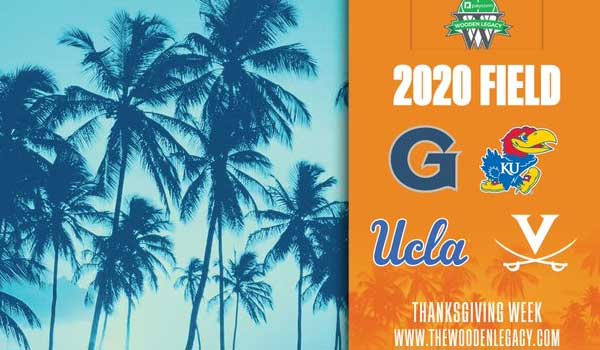John R. Thompson Jr. (1941-2020)John Thompson, head coach of Georgetown University men's basketball from 1972 to 1999 and one of the consequential figures in the history of intercollegiate athletics, died late Sunday evening at his home, three days before what would have been his 79th birthday.A cause of death has not yet been provided. Thompson had been in declining health over the past year.Additional Coverage
Atlanta Journal-Const. Boston Globe CBS Sports CNN Dan Patrick Show ESPN ESPN (2) ESPN (3) Esquire FiveThirtyEight Fredericksburg FL-Star Georgetown.edu Georgetown Voice GUHoyas.com NCAA.com NPR NY Daily News NY Post NY Post (2) NY Post (3) NY Times NY Times (2) Port Authur News Phila. Inquirer Providence Coll. Raleigh N&O St.Louis Post-Dispatch Syr. Post-Standard Syr. Post-Standard (2) Tampa Bay Times The Hill Time Magazine The Undefeated USA Today Wash. City Paper Wash. Examiner Wash. Post Wash. Post (2) Wash. Post (3) Wash. Post (4) Wash. Post (5) Wash. Post (6) Wash. Post (7) Wash. Times Wash. Times (2) Wash. Times (3) Winston-Salem Journal Yahoo Sports Yahoo Sports (2) Yahoo Sports (3) Whether loved or hated, sometimes feared, but always respected, John Thompson was a story of the American dream burnished with the struggle of the African-American experience. With many titles placed upon him over his years - All-American, NBA pro, coach, elder statesman - he is best referenced by a single word, one he took seriously and never ceased to impart on players, peers and people he met along the way: John was an educator. When he became head coach at Georgetown University in 1972, a fellow high school coach sent John Thompson a copy of the poem, "The Ladder of St. Augustine", by Henry Longfellow. In part, it reads: "The heights by great men reached and kept Were not attained by sudden flight, But they, while their companions slept Were toiling upward in the night." John Thompson was not an overnight success. His growth, and that of the University, was a confluence of hard work and a commitment to be the best it could be, when few saw the opportunity. His 27 years as head coach reshaped the role of basketball at Georgetown University and elevated him to a place of honor and respect in fields far removed from the basketball court. With the exception of four years at Providence College and two years with the Boston Celtics, John Thompson spent 73 years in the city of his birth: Washington DC. Born to a working class family in 1941, he grew up in segregated housing in Anacostia before moving to northwest Washington in the early 1950's. As a child, he struggled in school and was labeled as uneducable by teachers, only to find that his poor eyesight was the cause for his struggle in the classroom. By the age of 14 he ended up earning a scholarship to Archbishop Carroll High School, the first integrated Catholic high school in Washington. Joined by fellow All-Met selections in Walt Skinner, Ed Malloy, Tom Hoover and George Leftwich, Thompson and the Carroll Lions won 55 straight games over his final two seasons. Widely considered the greatest high school team in Washington DC history, the Lions were the talk of high school basketball and Thompson was named a second team Parade All-America selection. He received scholarship offers from St. John's, Syracuse, Boston College, St. Joseph's and Notre Dame, among others, while other schools (including Georgetown) passed on Thompson due to ongoing segregation in college basketball. With interest from Washington DC basketball legend and Boston Celtics general manager Red Auerbach, Thompson enrolled at Providence College, a nod to the territorial draft system that could provide Thompson a future career with the Boston Celtics. Averaging 32 points a game under freshman coach Dave Gavitt, Thompson joined the Providence varsity in 1961. In his three seasons, the Friars were 64-16, winning the 1963 NIT title and earning the school's first ever NCAA berth in 1964. Thompson ended his senior season as an All-America selection and New England Player of the Year, averaging 26 points and 14 rebounds a game. Graduating in 1964, Thompson was drafted in the third round by the Celtics, but had little choice but to be a backup to five time NBA MVP Bill Russell, and as such Thompson played sparingly on two NBA title teams as a result. In 1966, Thompson was relegated to the dispersal draft to staff the expansion Chicago Bulls, but chose not to relocate his young family there. At 25, his pro career was over, but with his economics degree from Providence, he set out on the next step of his journey. Thompson arrived at Georgetown in 1972 at the age of 30, following six years as the head coach at Washington DC's St. Anthony HS, taking the Tonies to a combined record of 122-28. Featuring a lineup made up largely of players he coached at St. Anthony, Thompson led the Hoyas to a 12-14 record in his first season. Early years were not smooth sailing for the team, with a cumulative record of 31-36 into February 1974. The team caught fire by winning eight of its final nine, qualifying for the fist ever ECAC-South basketball tournament. A last second shot by sophomore Derrick Jackson propelled the Hoyas to the tournament title and its first NCAA bid in 32 years. The 1970's built the foundation for the Georgetown teams that excelled under Thompson's leadership: dedicated, disciplined, and a reflection of its no-nonsense coach. Sports Illustrated, a frequent combatant with Thompson, called them "rough, tough, and terrific." Thompson wanted winners, but freely expressed he didn't want to recruit players who were not serious about getting an college degree. A deflated basketball, symbolic of the end of a sports career, was on display in his office to pose the question--when your career is done, do you have an education? Thompson and the program took pride in statistics which announced that all but two seniors had graduated from the program since 1972, and had little tolerance for those who did not, with those players usually asked to leave well before their last year. Georgetown won three of the first five ECAC-South titles, with a school best 24-5 record in 1979 before joining the Big East Conference. Over the next decade, Georgetown was ascendant as never before, winning six Big East titles, appearing in three Final Fours, two finalist appearances, and the 1984 NCAA national championship, a 12 year ascension that seemed completely unlikely given the state of the program when he arrived. John Thompson quickly became one of the most recognizable figures in college sports. Thompson was unapologetic for the program he created. "I will take suggestions from people I respect," he said in 1984, "but it's true that I completely ignore the people I don't respect." "I'm not St. John, but I'm not the devil either." With a record in he 1980's of 269-69 (.795), John Thompson was among the winningest coaches in the nation. But he was also among the most prominent black men in sports, a visible symbol to an entire generation of urban America. When he spoke, people took notice. During the 1988-89 season, during NCAA legislation that would have barred schools from offering scholarship aid to recruits below a 2.0 GPA and 700 SAT, Thompson walked off the court at Capital Centre at the start of its January 14, 1989 game versus Providence , saying he had "a moral obligation with what I believe in and what I coach for." Thompson's decision did what months of NCAA committee meetings could not--shed light on a rule change which would have arbitrarily ruled out college for a large number or recruits, regardless of the entrance requirements of a university. The NCAA withdrew the proposal soon thereafter, and Thompson returned to the bench within two weeks. A few weeks later, Thompson appeared on a nationally televised town hall on crime in the D.C. community. "There was a hush when he got up to speak on Nightline," recalled former Washington Post columnist Michael Wilbon. "It was like Martin Luther King [Jr.] was going to speak, I kid you not." Later that summer, when Rayful Edmond, a notorious Washington drug dealer who was seen associating with two players, Thompson called him to his office at McDonough Gymnasium and told him in no uncertain terms to back off his players. Wrote a columnist at SB Nation, Thompson "single-handedly scared the s--- out of one of the most infamous drug dealers in U.S. history." Having turned down a multi-million dollar offer to be general manager of the NBA's Denver Nuggets in the summer of 1990, Thompson entered his third decade as Georgetown coach. Georgetown continued to be a national power throughout the 1990's even if the teams of this decade didn't match up to the success of his predecessors. The Hoyas were 6-0 in Big East championship finals from 1980 to 1989, but 0-4 in the 1990's, losing two of these games in the final moments. Thompson took the Hoyas to six NCAA bids and two NIT's from 1991 to 1998, but none advanced to the Final Four. The decade peaked during the two years of Allen Iverson (1994-96), advancing to the 1996 NCAA regional final versus #1-ranked Massachusetts, but Iverson's departure for the NBA Draft ended a long running tradition under Thompson; namely, that Georgetown players stayed four years before pursuing the NBA. Thompson's teams of the 1990's struggled with transfers - then, as before, Thompson had little patience with players who were not maintaining their studies. But having missed out on a number of top freshmen earlier in the decade, the Hoyas lacked depth. Its 1997-98 team was hard hit, with the loss of one starting guard before the season and one who quit the team mid-season, and the Hoyas finished with a 16-15 record, its worst since 1974. Two months into a 1998-99 season that had the Hoyas at 7-6, Thompson shocked the sports world by unexpectedly resigning on Jan. 8, 1999, citing personal issues around a divorce after 35 years of marriage. Assistant coach Craig Esherick was elected to head coach following the resignation. "John Thompson's retirement is a huge loss for Georgetown and a huge loss for the Big East," said conference commissioner Mike Tranghese. "His contributions to the university and to college basketball are immense. I hope John feels he is making the right decision for himself. I am really pleased for the opportunity given to Craig [Esherick]. It's great that Georgetown has entrusted its program to him." Thompson made it clear that he was not retiring, but he did not return to coaching, enjoying two decades as an elder statesman. He was elected to the Basketball Hall of Fame in 1999. He also surprised many in the press by opting to host a daily sports talk show, one which became the most popular afternoon show in the city and was hosted for 12 years. He served as a radio analyst for NCAA tournament games for two decades and maintained a seat on the Nike board of directors through 2020. Thompson maintained an office at Georgetown and was frequently seen at practices and games of his three successors, all of which were closely aligned with his vision and expectation for the program. In 2015, the University named its new basketball practice facility in honor of Thompson, with a life-sized statue in the middle of the public area. In his last months, Thompson completed a long-awaited autobiography, one which he will leave us not with book signings or personal conversations about what he experienced, but the pages themselves. It will be personal, it will be frank, and it will ultimately be thought-provoking. John Thompson wouldn't have wanted it any other way. John is survived by his three children, John III, Ronald (C'92), and Tiffany, along with his grandchildren. Services are pending.
Statements From Georgetown OfficialsFrom GUHoyas.com, official statements from University and athletic officials:"Coach John R. Thompson Jr. had a profound impact on our university. Forty-eight years ago, he joined the Georgetown community and with his distinctive style, commitment to excellence, and clear sense of purpose, transformed Georgetown Basketball. We are a better university because of John's leadership: he challenged us to live up to our values and enabled all of us to see new possibilities, for ourselves, and for the impact we could have on the world. John will be remembered for many things, his historic achievements, the lives he shaped, his advocacy for social and racial justice, but perhaps most of all, for the authenticity through which he lived his life." John J. DeGioia, President"Our hearts are heavy today with the news of Coach Thompson's passing. While he broke barriers on the court, his legacy is the mark he made on our society as he fought each and every day for the rights of all people regardless of their race or where they came from. He was a coach, mentor, activist and friend and his death leaves a gaping hole within the basketball community and, in fact, our nation. My condolences go out to his family as we all reflect upon Coach Thompson's life and remember him as a trailblazer as well as a true Hoya."--Lee Reed, Athletic Director "Georgetown University, the sport of basketball and the world has lost someone who I consider to be a father figure, confidant and role model. He has done so much to impact my life and the people he has coached and mentored along the way. However, his reach went well beyond just those who he knew personally, he changed the world and helped shape the way we see it. He was a great coach but an even better person and his legacy is everlasting. My condolences and prayers go out to his family."--Patrick Ewing, Head Coach Washington Post ObituaryCoverage from the Washington Post followed after 10:00 AM this morning."Physically imposing at 6-foot-10 and nearly 300 pounds and possessed of a booming bass voice that commanded authority better than a shrill whistle could, Mr. Thompson built his teams around similarly intimidating centers such as Patrick Ewing, Dikembe Mutombo and Alonzo Mourning and a physical, unrelenting approach to defense." "His most profound contribution to the game was his grasp of its power to lift disadvantaged youngsters to a better life. He used college basketball, and his stature in the sport, as a platform from which to demand greater opportunities for Black athletes to gain the college education they might otherwise have been denied.""My father never learned to read, never made anywhere near the kind of money I make, but he was a success. So was my mother," Mr. Thompson told The Post in 1984. "I am perceived as a success by standards created by white people. My team wins a lot of games; I make a lot of money. When I'm 80 and look back, is that going to make me think of myself as a success? I don't think so. "But if I change some things, even slightly, if I stand up on this platform I've been given and say, No, this is wrong, then maybe I will feel good about myself. I may not change anything, and I know I'm going to upset some people. But I can live with that." From The Athletic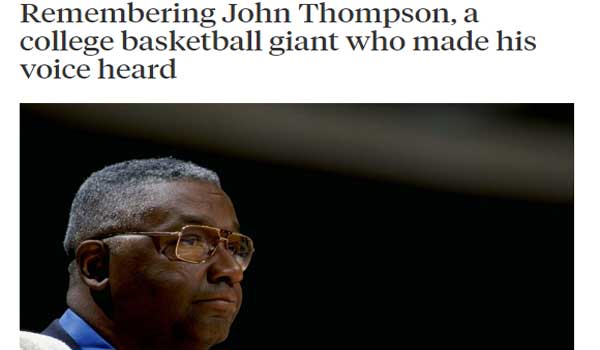
For now, the Athletic has taken a breather from its paywall to post Dana O'Neil's thoughts on John Thompson."Thompson was, by definition, a basketball coach, and an extraordinary one at that. He won a national title and 596 games, building a Hall of Fame career by turning Georgetown into a national power, and in the eyes of its rivals, a national menace. In and of itself that would have been enough. Except that didn't suit Thompson. Not one to be content with staying between the lines, he strayed out of the coaching box and used his platform to rattle cages, refusing to stick to sports before sticking to sports was a thing. He fought passionately for what he believed in, and against anyone who stood in his way, quietly standing tall against racial strife and boldly confronting institutional racism to the benefit of thousands of college athletes. Thompson engendered, and almost required reaction. He found comfort in the uncomfortable, demanding conversation if not answers, and refusing to settle for good enough when something better was within reach.He made you laugh, he made you angry but above all else, he made you think." From The Voice Of the Hoyas— Rich Chvotkin (@HoyasWin) August 31, 2020 And From John FeinsteinTo a generation of Georgetown fans, there may not have been a more consistent critic of John Thompson than John Feinstein. But as he did with former foes from Morgan Wooten to Jim Boeheim, Thompson made his peace, as the columnist explained in a column today."The past few years, we talked often, usually when I was seeking guidance or advice," Feinstein writes. "Two years ago, when I wanted to do a book about race in sports but had no idea how to structure or even start the book, I went to see John. I explained my problem. He looked at me for a moment then laughed that deep, unforgettable laugh. "You might as well try to explain the Holy Trinity," he said. Then he turned serious and said, "Which is why it's a book you absolutely have to do.""I'm working on it now. There's a lot of work left and I'm still not sure where to begin. But at the very least, I have the dedication: "To John Thompson, who taught me about basketball; about how to listen and learn; about race relations and about life." Statement From The Family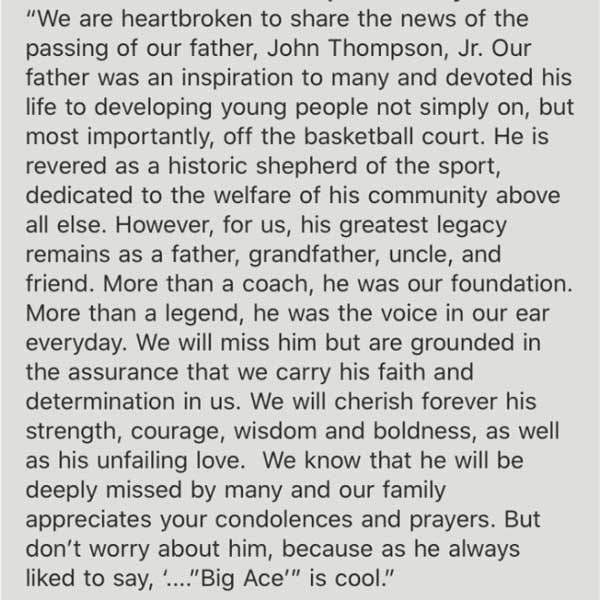
BULLETIN: John R. Thompson Jr. (1941-2020)WTEM radio is reporting the death of John Thompson, 18th head coach of Georgetown University basketball from 1972 through 1999.
2020-21 Big East Rankings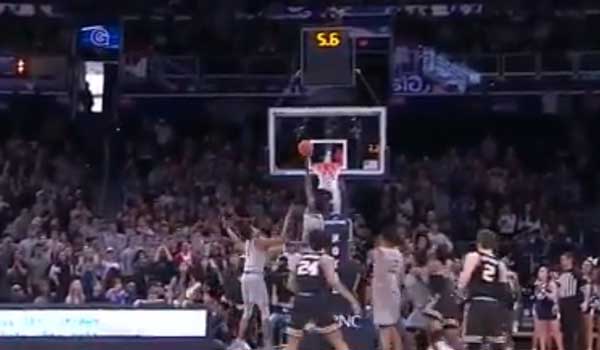
Columnist Jon Rothstein is the latest to offer a pre-season forecast for the Big East in College Hoops Today, picking Georgetown last.Jon's Picks:
2. Creighton 3. Connecticut 4. Providence 5. Seton Hall 6. Xavier 7. Marquette 8. St. John's 9. Butler 10. DePaul 11. Georgetown Rothstein is favorable on the return of Connecticut. "Sophomore guard James Bouknight should be one of the best players in the Big East next season while 6-6 freshman Andre Jackson was a consensus top-50 recruit with major upside. Hurley also already has commitments from three top 100 prospects in the 2021 class. After winning 19 games a year ago, expect UConn to return to the NCAA Tournament next spring for the first time since 2016." The Class of 2024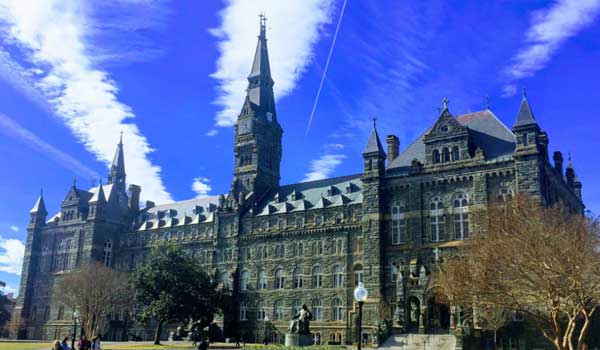
For the 230th consecutive year, students have returned to Georgetown... well, sort of.Known in academic circles as "Generation Z", today's Hoyas may be better known as the Zoomers, entering what could be a semester (or more) as remote participants to a college experience built on platforms of shared experience. For now, anyway, today's freshman don't know the majesty of walking through Healy Gates as the bells chime, a stroll across Red Square at lunch (never mind that the inside joke of the name itself is completely foreign to them), or sharing a meal with new friends across the dining hall at dinner.In the words of Robert Collier's alma mater, today's freshmen will have to wait a while before they discover "where Potomac's tide is streaming, from her spires and steeples beaming." But when they graduate on campus in 2024, this should be a different world than how they entered college during a time of distrust, disinformation, and disorder. If it's not, well, we've all failed. From a practical sense, this is a different era. It's the first Georgetown class that has no memory of 9/11, because they weren't born. Of the students admitted to the class, 28 percent are Asian American, 13 percent are Hispanic, and 11 percent are African-American. The old joke that half the student body lived along the New Jersey Turnpike is well, old. So what's the world like to an incoming freshman?
More On Big East Bubble Plans
Discussions continue among Big East athletic directors to a "bubble" approach to conference scheduling, according to the New York Post.In a previous story earlier this summer, columnist Adam Zagoria reported that that Omaha's CHI Health Center, home of Creighton men's basketball, is one of the sites considered, along with IMG Academy in Bradenton, FL, as a site where multiple Big East games would be played as a protection against COVID-19 spread among teams."We definitely talk about it," said St. John's athletic director Mike Cragg. "There's been discussions in every meeting since June about different concepts and over the last two to three weeks we've had presentations of some early ideas from the league office, how it could look." Cragg continued that "I'm not in favor of a three-month bubble or the whole season. That's not practical. I am interested in short bursts of a bubble. If you can create a two- or three-week bubble and play six or eight games, I think that makes a lot of sense." Georgetown Track Coach ResignsJulie Culley, director of the Georgetown men's and women's track programs, resigned on Wednesday, per a late evening release at GUHoyas.com.Culley will join the marketing group at Brooks Running, a Seattle based shoe and apparel manufacturer.Culley, 37, joined the Georgetown staff in 2014 and was elevated to head coach in 2016 following the departure of Michael Smith (C'02), who left Georgetown for Northern Arizona just three months after being elevated to the position. For an athletic program known for its longevity among head coaches, Culley is the second head coach to leave Georgetown within the past 30 days. On July 20, baseball coach Pete Wilk left the program after 21 seasons; the search is ongoing for his replacement. What-If: The Story Of Willie Pearson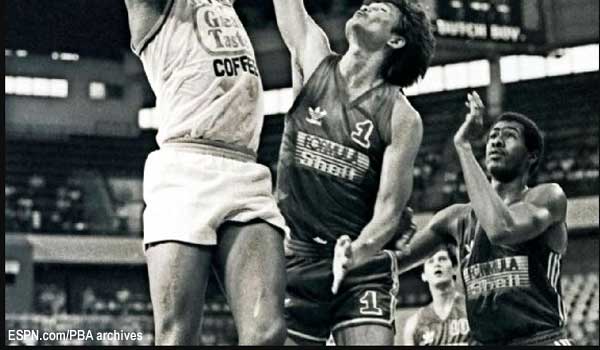
The name of Willie Pearson appears nowhere in Georgetown's basketball annals. But for a brief visit a world away from Washington, things could have been different.A 6-1 guard, Pearson grew up in Hawaii and owing to dual citizenship played on a pair of teams: Chaminade University, then an NAIA school, and the Philippine national team. Pearson played two seasons at Chaminade from 1977 to 1979, averaging 60 percent from the floor with a 16.4 points per game average.Per an account at ESPN.com, Pearson was traveling with the Philippine team in Kuwait, circa 1980, and recalled when a man from the US introduced himself. "Are you Pearson?" he asked. "Are you with the Philippine national team? I need a point guard. You have one more year of eligibility in your college career. How would you like to come play for me? I can give you [all] the playing time that you need." Pearson, not knowing who the man was, politely declined and moved on, eventually playing three more seasons with the national team. What he didn't realize was that the man was reported as John Thompson. "I didn't know who he was until later, and then I realized [he] got Pat Ewing," Pearson said. "I kept thinking and thought about that all the time, what it would have been like if I took the offer?" Pearson's story may require some additional scrutiny, however. It is not explained in the article how or why John Thompson would be in Kuwait for a recruiting visit in 1980, as contemporary media guides do not list any such travels by the coach. Georgetown was not recruiting internationally at the time--even the signing of Dikembe Mutombo seven years later was done without a visit from the head coach. A further quote in the article states that Thompson told Pearson "I'm gonna be coaching Georgetown," when he had already been head coach for eight years. Big East Considering Omaha Bubble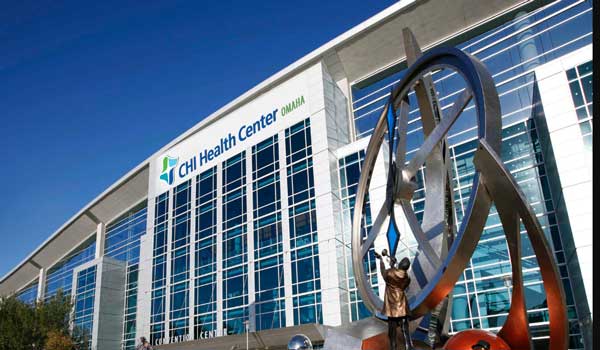
On the same day the Big East announced the cessation of fall sports, a news report from Big East columnist Adam Zagoria suggests the conference is actively seeking a central site to host all men's basketball games as early as January.A report at Forbes.com notes that Omaha's CHI Health Center, home of Creighton men's basketball, is one of the sites considered, along with IMG Academy in Bradenton, FL."We had to build a bubble, a dome, where we had to put three temporary courts in," a source at IMG told Forbes. "The day they were here, they had like four conferences call them about getting six floors and trying to create bubble atmospheres. And the Big East was one of the conferences that called then, and I know that Omaha is one of the sites that they talked about for a possible bubble." Omaha, the most distant from any other Big East city, would offer not only the arena, but nearby practice facilities at Creighton, located just over one mile from the arena. Chief among them would be the Creighton University Championship Center, built in 2014, which includes two practice courts, locker rooms, an athletic performance center, and training facilities. At the time, commissioner Val Ackerman said the facilities "will be among the best on-campus athletic facilities we have in the [Big East]." Another factor favoring Nebraska? The state presently has no travel restrictions. Quarantine rules apply in six Big East member states (CT, IL NJ, NY, PA, RI) and the District of Columbia, where indoor events are prohibited until at least October 9. Wooden Legacy Loses UCLA,
| ||||||||||||||||||||||||||||||||||||||||||||||||||||||||||||||||||||||||||||||||||||||||||||||||||||||||||||||||||||||||||||||||||||||||||||||||||||||||||||||||||||||
Georgetown Attendance Up 10%

Average attendance for Georgetown games showed a 10 percent improvement from 2019-20, per the official NCAA attendance averages posted late last week.
Georgetown averaged 7,931 per game, up from a 30-year low of 7,212 in 2018-19, which ranked 66th among 351 Division schools. The Hoyas ranked 8th of ten Big East schools in average attendance for both regular season and Big East play, where GU averaged 8,854 per game in conference.Big East attendance totals are below. Five schools finished in the top 40 nationally, led by Creighton.
| Team | 2019-20 (All Games) |
% Capacity | 2019-20 (Big East) |
% Capacity |
| 5. Creighton | 17,314 | 94.5% | 17,796 | 97.1% |
| 15. Marquette | 15,145 | 86.5% | 15,564 | 88.9% |
| 31. Villanova [1] | 11,299 | 86.7% | 10,986 | 86.4% |
| 36. Seton Hall [1] | 10,328 | 77.9% | 11,746 | 76.7% |
| 38. Xavier | 10,311 | 100.5% | 10,367 | 101.1% |
| 41. Providence | 10,064 | 81.0% | 11,569 | 93.2% |
| 57. Butler | 8,617 | 94.6% | 9,005 | 98.9% |
| 66. Georgetown | 7,931 | 38.6% | 8,854 | 43.1% |
| 82. St. John's [1] [2] | 5,641 | 52.0% | 7,774 | 51.5% |
| 98. DePaul | 5,187 | 49.9% | 5,965 | 57.4% |
[1] Reflects average based on capacity of two home facilities.
[2] St. John's submitted an incorrect attendance figure to the NCAA (6,236 per game), counting its first round Big East Tournament game versus Georgetown (attendance: 17,734) as a home game rather than a neutral site game. The numbers above are net of this game.
Omaha World Herald: Hoyas 11th of 11

From the Omaha World-Herald, this question: "How long will another rebuild take?"
The View From Omaha:
-
1. Villanova
2. Creighton
3. Providence
4. Connecticut
5. Seton Hall
6. Xavier
7. St. John's
8. Butler
9. Marquette
10. DePaul
11. Georgetown
As for Georgetown, there may some recency bias in here--the Hoyas are 1-5 versus the Blue Jays in the Patrick Ewing era, but Nyatawa is not as hopeful.
"Patrick Ewing is a Georgetown legend, so he's earned a considerable amount of grace, but the Hoyas are five years removed from their last NCAA tournament berth. Progress is needed soon."
Basketball In a Pandemic:
The 1918-19 Georgetown Varsity
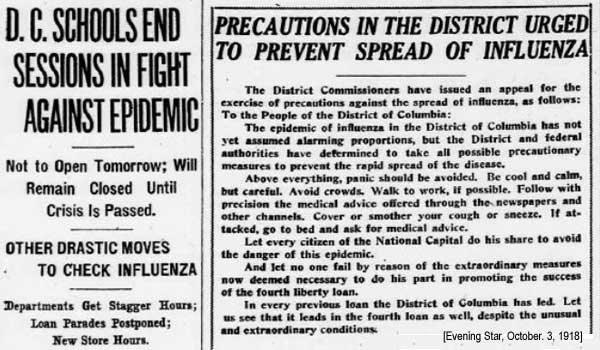
As Georgetown University considers its options for men's basketball in the wake of COVID-19, it's not the first time the University has been in this situation.
The fall of 1918 featured the second of three waves of the influenza outbreak known as "Spanish flu"; the pathogens were unrelated to Spain but given the name because wartime censorship on its reporting was not an issue in Spain, which was neutral in World War I. As such, coverage of the first wave in the spring 1918 was suppressed in contemporary media for the good of the war effort.The same could not be said in the fall, particularly in Washington DC. The first two cases on influenza were reported on Sep. 19, 1918, and within two weeks had increased to 213 cases and 21 deaths. District commissioners closed all schools, churches theaters, movie houses, and indoor events of every kind to combat the spread. The Law School was closed outright, while the College, under the auspices of the Student Army Training Corps, was allowed to continue but with a full quarantine on the campus, which was closed to all visitors.
There were no team sports during the shutdown, which lasted a month. Bowing to political pressure, the local stay at home orders were lifted for the war effort, and a moderate increase in cases followed. Georgetown opted for a five game football season in November 1918, with four games at home against local Army installations. A trip to Fordham was its only loss in a five game, 19 day season.
Then as now, playing a football season had issues for colleges beyond competition. Revenues from home football games accounted for 57 percent of revenues for the Georgetown athletic budget in 1918, compared to just seven percent for basketball.
The basketball season, which generally began in early December, was delayed until January, reducing its season to 10 games, nine within the city. Its only road trip was to Annapolis, falling to Navy.
With a third wave of the flu nearing, Georgetown's entire season was completed in just 36 days, ending on Feb. 15, 1919 with a 9-1 record. As a by-product of the situation, members of the varsity teams were given an extra year of eligibility following the 1918-19 season--a welcome benefit for a team which returned all five starters the following season and went 13-1.
| 1918-19 (9-1) | vs | Opponent | Site | ||||
| 1/10/1919 | W | 34 | 29 | Johns Hopkins | Ryan Gym | ||
| 1/14/1919 | W | 59 | 13 | Camp Humphrey (VA) | Ryan Gym | ||
| 1/22/1919 | L | 15 | 22 | at | Navy | Dahlgren Hall | |
| 1/24/1919 | W | 39 | 14 | Randolph-Macon | Ryan Gym | ||
| 1/25/1919 | W | 32 | 15 | George Washington | Ryan Gym | ||
| 1/29/1919 | W | 48 | 22 | Gallaudet | Ryan Gym | ||
| 1/31/1919 | W | 33 | 26 | NYU | Ryan Gym | ||
| 2/8/1919 | W | 35 | 14 | at | George Washington | YMCA Hall | |
| 2/11/1919 | W | 31 | 22 | Virginia Tech | Ryan Gym | ||
| 2/15/1919 | W | 46 | 25 | Camp Humphrey (VA) | Ryan Gym | ||
The morbid statistics of the current outbreak have not yet reached the velocity of the 1918-19 pandemic. As many as 675,000 people in the U.S. died during the 1918-19 pandemic, most in the fall of 1918. (In a stark contrast to today's reports, 99 percent of fatalities from the 1918-19 pandemic were under the age of 65.) Washington DC saw 33,719 cases in just four months, or an infection rate of eight percent of the entire city population; in total, a total of 2,895 died over four months.
Contemporary media did not report any Georgetown students dying of the flu, but two former basketball payers died while in military service, including John Martin, who played basketball in the 1912-13 season, and Alexander "Pat" Finnegan, who played just a year earlier on the 1917-18 team before joining the U.S. Army.
"Here it is necessary to pause sadly and record the untimely death of Pat Finnegan, a victim of influenza after just gaining his commission at Plattsburg," wrote the Ye Domesday Booke yearbook. "In his death [the class of 1921] suffered a genuine loss, for he was one of our ablest and best-liked."
Martin and Finnegan were among 54 Georgetown alumni killed in miltary service during World War I. Fifty four poplar trees, one for each alumnus, were planted in a wooded area north of Ryan Gymnasium in 1919 in a solemn ceremony to be a living memorial for future generations.
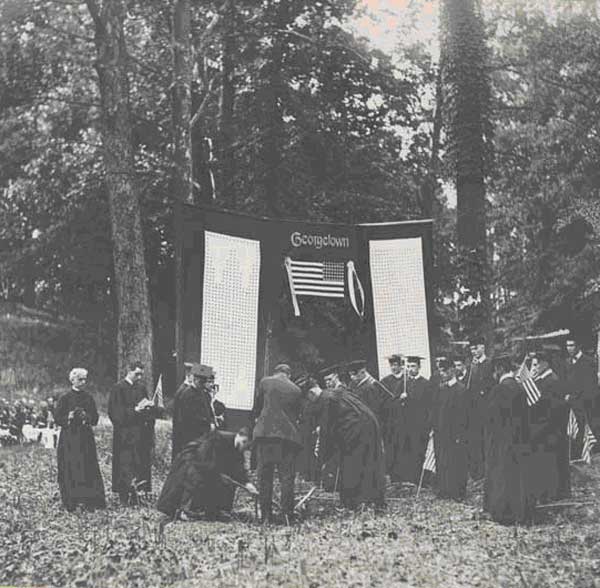
A decade later, with the memory of the "Memorial Grove" apparently forgotten by the College, the trees were bulldozed in the construction of Copley Hall.
Adams Joins Alcorn Staff
Former Georgetown center Tyler Adams (C'15) has been named an assistant coach at Alcorn State.
Mississippi Native Tyler Adams Hired as Assistant Menís Basketball Coach https://t.co/9CUVJoOCDc
— Alcorn Sports (@BRAVESSPORTS) August 6, 2020
Another Pre-Season Poll
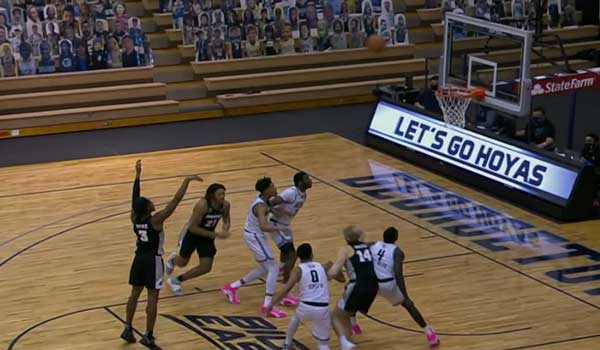
From the Asbury Park Press, veteran reporter Jerry Carino has posted his pre-season picks for the Big East, with Georgetown 11th.
Carino's Choice:
-
1. Villanova
2. Creighton
3. Connecticut
4. Seton Hall
5. Providence
6. Xavier
7. Butler
8. St. John's
9. Marquette
10. DePaul
11. Georgetown
"There's been public speculation about disenchanted "Power Five" football conferences breaking off from the NCAA and starting their own championship events," Carino writes. "Any tourney without the Big East would be flat-out phony.
"Current league members have won six of the past 21 NCAA titles, one might be the nation's No. 1 team in 2020-21, and the conference should be deep as usual, with six or seven teams capable of making the field of 68. Any national title contested without them would be as legitimate as the Loch Ness Monster."
Big East All-Academic Teams
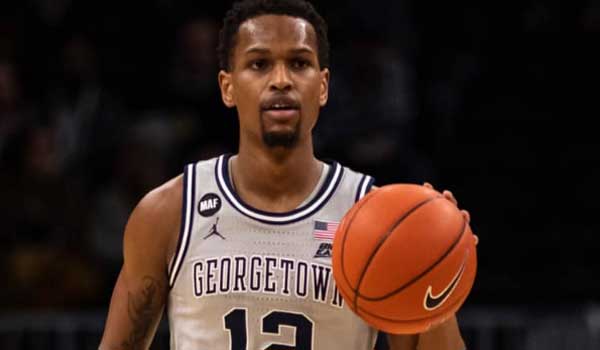
In a difficult 2019-20 season, some good news off the court.
Of the 12 players who remained with the team following the transfer of four players in December, nine were selected to the Big East All-Academic teams in a conference announcement Monday. The team recognizes student-athletes with a 3.0 or better grade point average last season, of which 365 Georgetown students and nearly 3,000 across the league were so honored.While many GU sports regularly salute this accomplishment among their teams, men's basketball generally has not, but this is an opportunity to do so. Congratulations to Terrell Allen, Chuma Azinge, Tim Ighoefe, Mac McClung, Jagan Mosely, George Muresan, Jaden Robinson, Qudus Wahab, and Malcolm Wilson for this recognition.
Georgetown Lands Second 2021 Commit
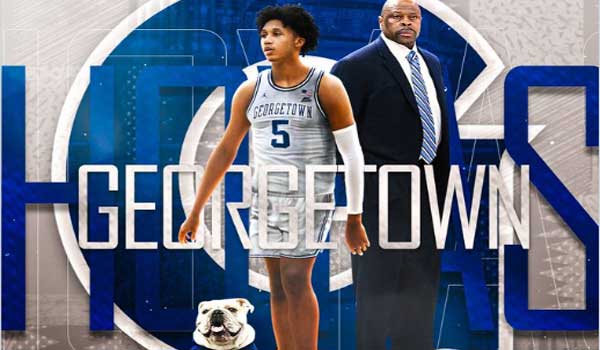
6-6 forward Jalin Billingsley is the second signee for Georgetown's 2020-21 recruiting cycle, announcing a verbal commit Saturday.
Billingsley, a rising senior at Lutheran East HS in Cleveland, OH, is ranked #147 nationally, averaging 17.4 points per game as a second team Division II all-state selection. He chose Georgetown over offers from Arizona State, Penn State, Akron, and West Virginia, among others.Depending on the status of former 2020 commit Tyler Beard, now pursuing a prep school option, Georgetown either has one or two scholarships remaining for the 2020-21 recruiting cycle.
